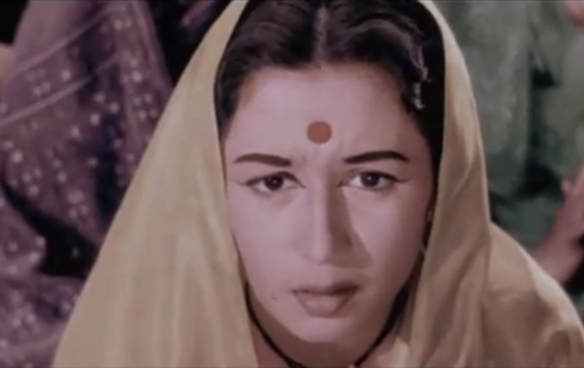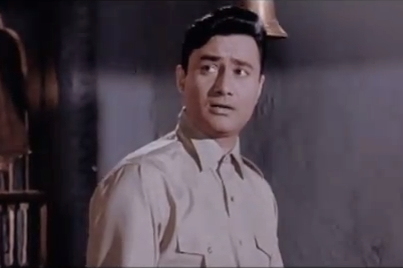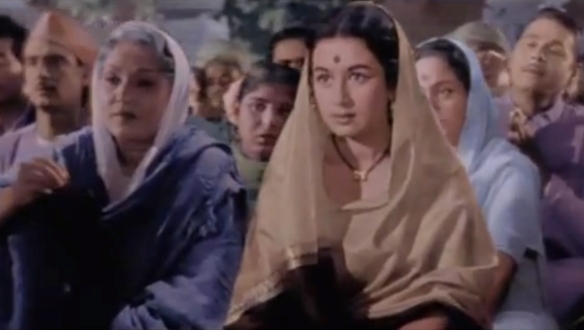Happy New Year’s to all our readers! What an incredible year it’s been for us to write this blog and to have enjoyed discovering so many fellow fans of classic Bollywood cinema! I grew up in a Hindu Punjabi family, and in my house, we always celebrate the New Year’s with a havan the morning of January 1st with friends in the community. There’s something calming and cozy about these annual gatherings–we keep it casual where I’m from while taking a break to reflect on the year behind on us and what lies ahead. In the spirit of auspicious beginnings, we shall present the lyrics and full English translation to one of Bollywood’s greatest bhajans “Allah Tero Naam” from Hum Dono (1961). Rendered impeccably by Lata Mangeshkar, “Allah Tero Naam” soars with bi-partisan Hindu-Muslim appeal in a humble call to God for wisdom and strength. The iconic number is one of Lata’s personal favorite Jaidev compositions!

Nanda sings the gentle bhajan “Allah Tero Naam” in Hum Dono (1961) as a special expression of bipartisan devotion in Hindi films.
For me, Hum Dono (1961) is one of the finest films of Dev Anand’s illustrious career: it glows with a constantly-twisting plot and a golden soundtrack that places the film among the legends of cinematic history. Dev Anand was well-known for pushing the envelope of societal norms as a director, and the troubling predicaments his characters find themselves in always astound–whether falling in love with a woman who thinks he’s her brother (Bombay Ka Babu), conducting whirlwind affairs with three women at once (Teen Devian) or romancing another man’s wife who believes he’s her real husband (Hum Dono). The plots are scintillating and the acting invariably superb. Furthermore, did I mention Hum Dono a quasi-twin movie too? Couple that with a war-time theme and you can readily imagine the opportunities for confusion of epic Bollywood proportions. See our earlier translation of “Main Zindagi Ka Saath” from the same film!
The Lata Mangeshkar solo is one of the film’s many high points, arriving midway through the film as Nanda prays for her husband’s safe return from the war. The time period was arguably when Lata’s voice was at her most angelic, and the graceful, gentle maneuvers of this song will leave you breathless for more!
Perhaps one of the greatest aspects to “Allah Tero Naam” is the Hindu-Muslim crossover lyrics. Reminiscent of “Ishwar Allah Tero Naam” later rendered by Mohammed Rafi in Nayaa Raastaa (1970), this bhajan encompasses an important and unique aspect of Indian spirituality–the transcendence of religious barriers (which holds a particular intrigue in a war-time themed filmed!) You guessed it, the lyrics are penned by that sensitive soul Sahir Ludhiviani, who’s feelings against war and it’s horrors are a theme in many later works (“Khuda-e-bartar,” anyone?). So whether you adore this song for the lyrics, the rendition, or just for Nanda’s emotive eye-batting, we hope you enjoy the lyrics and our English translation to “Allah Tero Naam” and wish you a happy New Year!
Allah Tero Naam Lyrics and Translation:
Allah tero naam, Ishwar tero naam
Your name is Allah, your name is Ishwar
Sab ko sanmatii de, Bhagwan
Bless everyone with equanimity, God
Maango.N kaa sindoor na chhuuTe
Do not let the sindoor disappear from the part of our hair [Let us not be widowed]
Maa.N bahano.N kii aas na TuuTe
Do not shatter the hopes of mothers and sisters
Deha binaa, Daataa…
Without a body, Lord…
Deha binaa bhaTake na praan
Let the soul not wander without a body
O saare jag ke rakhwaale
O keeper of the whole world
Nirbal ko bal denewaale
The giver of strength to the weak
Balwaano.N ko…
To the strong…
Balwaano.N ko de de gyaan
Bestow wisdom to the strong
Glossary:
Allah: God [Muslim]; Ishwar: God [Hindu]; sanmatii: equanimity, advise; maaNg: the parting line in a woman’s hair; sindoor: red powder worn in a woman’s hair part to signify marriage; maa.N: mother; bahan: sister; aas: hope; TuuTnaa: to break, to shatter; deha: body; Daataa: Lord; bhataknaa: to wander; praan: soul, life; rakhwaalaa: the keeper; nirbal: weak; bal: strength; balwaan: one who is strong, a warrior; denewaalaa: the giver; gyaan: wisdom, knowledge

Dashing as always Dev Anand is torn from his family and caught in a moral dilemma in Hum Dono (1961).
Ever wondered why some songs use the term “tero” instead of “teraa” such as in this devotional? It’s a grammatical exception in the Hindustani language that you’ll only find in a direct address to God! It’s always nice to start a new year with linguistic trivia. Here at Mr. and Mrs. 55, our New Year’s resolution is to blog more often–we’re almost nearing our 100th post!
– Mrs. 55


One of my favorite Bhajans and its always wonderful great to start off the New Year with blessings for all. Best of luck to both you and I am sure you will reach happy “100” in no time. I hope you continue to say a prayer on the first of the year along with your resolutions and I am sure they will all come true. Bless both of you!
We’re glad you enjoyed the post! Here’s to a productive new year for everyone! 🙂
Thanks for this! I am enjoying your blog.
Just wanted to point out that Allah and Ishwar are not really Muslim and Hindu words, respectively, even though in context they are used that way.
Allah is Arabic for God, and Arab Christians use the same word. Khuda is Persian for God, and is also not restricted to Islam.
Ishwar comes from Sanskrit for Lord. It also does not imply any one religious view. Most translations of the Bible into Hindi use Ishwar (or Parmeshwar) for God.
Thanks for reading! Yes, “Allah” and “Ishwar” are not strictly Muslim or Hindu words, however we mention their most common religious association to highlight the all-encompassing nature of this particular bhajan.
lovely song…as was the one in the last post ‘jaane kaise sapnon mein’…..Your blog has been a great discovery for all of us as well, it adds something pleasant and interesting to our day….lol… totally endorse your New Years resolution to blog more often 🙂 …more interesting stuff for us to read!
We appreciate the endorsement! Have a great New Year and keep up your enlightening comments! 🙂
Great post! Happy New Year to Mr. and Mrs. 55! I hope your website attracts even more readers and gathers even more fans in 2013.
By the way, could you explain how Dev Anand pushes social envelopes in Hum Dono?
Wishing you & all your loved ones a very happy, healthy, wonder-full new year 🙂
Though belated, these greetings also come as an appreciation for your blog & contents. They’ve brightened up many a day & brought many a smile over these past few months.
May the same joy be extended to you in all you undertake 🙂
Pingback: Abhi Na Jao Chod Kar Lyrics and Translation: Let’s Learn Urdu-Hindi | Mr. & Mrs. 55 - Classic Bollywood Revisited!
I have heard a further verse on Vividhbharati. Sadly was never picturised. The additional verse is fantastic and quintessential Sahir.
Is Dharthi ka roop na ujhde: Pyaar ki thandi dhoop na ujhde:
Sabko mile Dhaata, sabko mile, iska Vardaan.
The Earth’s beuty and Love’s tender warmth, may this Grace be, o Giver, denied to none.
Not much to ask for, is it?
Here’s a rare, vinyl version of the song with an alternate antra in the beginning.
Kudos to the two of you.
I was looking for a prayer for PEACE in Gaza and this song came to mind. Lataji has put ‘jaan’ in the song. Very touching and very appropriate in such situations of strife.
Your translation is perfect. May God bless the two of you.
May PEACE prevail the world over.
Amen.
– RMack
I’ve been listening to this for some time and it’s nice to see the translation to bring it even closer to my heart.
Thank you very much for this! Love your blog.